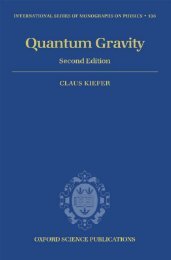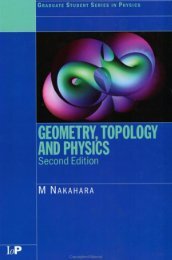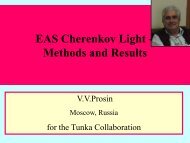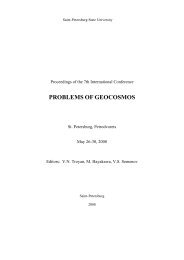- Page 2:
Quantum Gravitation
- Page 8:
Prof. Dr. Herbert W. Hamber Univers
- Page 14:
Preface Almost a century has gone b
- Page 18:
Preface ix mately leading to the Ei
- Page 22:
Preface xi thereof) have meaning an
- Page 26:
Acknowledgements Over the years I h
- Page 32:
xvi Contents 4 Hamiltonian and Whee
- Page 36:
Chapter 1 Continuum Formulation 1.1
- Page 40:
1.3 Wave Equation 3 One important a
- Page 44:
1.3 Wave Equation 5 e 01 + e 31 = 0
- Page 48:
1.3 Wave Equation 7 Fig. 1.1 Lowest
- Page 52:
1.3 Wave Equation 9 with s μν = 1
- Page 56:
1.4 Feynman Rules 11 One can exploi
- Page 60:
1.4 Feynman Rules 13 and the gravit
- Page 64:
1.4 Feynman Rules 15 where the p 1
- Page 68:
1.5 One-Loop Divergences 17 D = 2 +
- Page 72:
1.5 One-Loop Divergences 19 R 2 =
- Page 76:
1.6 Gravity in d Dimensions 21 1.6
- Page 80:
1.6 Gravity in d Dimensions 23 ∇
- Page 84:
1.7 Higher Derivative Terms 25 case
- Page 88:
1.7 Higher Derivative Terms 27 theo
- Page 92:
1.7 Higher Derivative Terms 29 ∫
- Page 96:
1.7 Higher Derivative Terms 31 trln
- Page 100:
1.8 Supersymmetry 33 treated pertur
- Page 104:
1.8 Supersymmetry 35 and Σ’s has
- Page 108:
1.9 Supergravity 37 δA μ = −2g
- Page 112:
1.9 Supergravity 39 The first order
- Page 116: 1.10 String Theory 41 of the string
- Page 120: 1.10 String Theory 43 Solutions to
- Page 124: 1.10 String Theory 45 and for the o
- Page 128: 1.10 String Theory 47 with [dg ab ]
- Page 132: 1.11 Supersymmetric Strings 49 One
- Page 136: 1.11 Supersymmetric Strings 51 of c
- Page 140: 1.11 Supersymmetric Strings 53 ∫
- Page 144: Chapter 2 Feynman Path Integral For
- Page 148: 2.2 Sum over Paths 57 ∫ ∞ A(q i
- Page 152: 2.4 Gravitational Functional Measur
- Page 156: 2.4 Gravitational Functional Measur
- Page 160: 2.4 Gravitational Functional Measur
- Page 164: 2.5 Conformal Instability 65 ∫ I
- Page 170: 68 3 Gravity in 2 + ε Dimensions L
- Page 174: 70 3 Gravity in 2 + ε Dimensions
- Page 178: 72 3 Gravity in 2 + ε Dimensions
- Page 182: 74 3 Gravity in 2 + ε Dimensions g
- Page 186: 76 3 Gravity in 2 + ε Dimensions F
- Page 190: 78 3 Gravity in 2 + ε Dimensions T
- Page 194: 80 3 Gravity in 2 + ε Dimensions
- Page 198: 82 3 Gravity in 2 + ε Dimensions
- Page 202: 84 3 Gravity in 2 + ε Dimensions I
- Page 206: 86 3 Gravity in 2 + ε Dimensions a
- Page 210: 88 3 Gravity in 2 + ε Dimensions (
- Page 214: 90 3 Gravity in 2 + ε Dimensions T
- Page 218:
92 3 Gravity in 2 + ε Dimensions o
- Page 222:
94 3 Gravity in 2 + ε Dimensions n
- Page 226:
96 3 Gravity in 2 + ε Dimensions
- Page 230:
98 3 Gravity in 2 + ε Dimensions N
- Page 234:
100 3 Gravity in 2 + ε Dimensions
- Page 240:
Chapter 4 Hamiltonian and Wheeler-D
- Page 244:
4.2 First Order Formulation 105 ṗ
- Page 248:
4.3 Arnowitt-Deser-Misner (ADM) For
- Page 252:
4.3 Arnowitt-Deser-Misner (ADM) For
- Page 256:
4.5 Intrinsic and Extrinsic Curvatu
- Page 260:
4.6 Matter Source Terms 113 One sti
- Page 264:
4.8 Semiclassical Expansion of the
- Page 268:
4.9 Connection with the Feynman Pat
- Page 272:
4.10 Minisuperspace 119 is the inve
- Page 276:
4.10 Minisuperspace 121 H = p a ȧ
- Page 280:
4.11 Solution of Simple Minisupersp
- Page 284:
4.11 Solution of Simple Minisupersp
- Page 288:
4.12 Quantum Hamiltonian for Gauge
- Page 292:
4.13 Lattice Regularized Hamiltonia
- Page 296:
4.13 Lattice Regularized Hamiltonia
- Page 300:
4.13 Lattice Regularized Hamiltonia
- Page 304:
4.14 Lattice Hamiltonian for Quantu
- Page 308:
4.14 Lattice Hamiltonian for Quantu
- Page 312:
4.14 Lattice Hamiltonian for Quantu
- Page 316:
Chapter 5 Semiclassical Gravity 5.1
- Page 320:
5.1 Cosmological Wavefunctions 143
- Page 324:
5.1 Cosmological Wavefunctions 145
- Page 328:
5.2 Semiclassical Expansion 147 wit
- Page 332:
5.2 Semiclassical Expansion 149 log
- Page 336:
5.2 Semiclassical Expansion 151 ∫
- Page 340:
5.3 Pair Creation in Constant Elect
- Page 344:
5.4 Black Hole Particle Emission 15
- Page 348:
5.4 Black Hole Particle Emission 15
- Page 352:
5.5 Method of In and Out Vacua 159
- Page 356:
5.5 Method of In and Out Vacua 161
- Page 360:
5.6 Complex Periodic Time 163 5.6 C
- Page 364:
5.6 Complex Periodic Time 165 with
- Page 368:
5.8 Quantum Gravity Corrections 167
- Page 372:
Chapter 6 Lattice Regularized Quant
- Page 376:
6.3 Volumes and Angles 171 Fig. 6.2
- Page 380:
6.4 Rotations, Parallel Transports
- Page 384:
6.4 Rotations, Parallel Transports
- Page 388:
6.4 Rotations, Parallel Transports
- Page 392:
6.5 Invariant Lattice Action 179 6.
- Page 396:
6.5 Invariant Lattice Action 181 Th
- Page 400:
6.5 Invariant Lattice Action 183 wh
- Page 404:
6.6 Lattice Diffeomorphism Invarian
- Page 408:
6.7 Lattice Bianchi Identities 187
- Page 412:
6.8 Gravitational Wilson Loop 189 w
- Page 416:
6.9 Lattice Regularized Path Integr
- Page 420:
6.9 Lattice Regularized Path Integr
- Page 424:
6.10 An Elementary Example 195 ∫
- Page 428:
6.10 An Elementary Example 197 wher
- Page 432:
6.11 Lattice Higher Derivative Term
- Page 436:
6.11 Lattice Higher Derivative Term
- Page 440:
6.12 Scalar Matter Fields 203 if an
- Page 444:
6.12 Scalar Matter Fields 205 A ij
- Page 448:
6.12 Scalar Matter Fields 207 defin
- Page 452:
6.13 Invariance Properties of the S
- Page 456:
6.14 Lattice Fermions, Tetrads and
- Page 460:
6.15 Gauge Fields 213 6.15 Gauge Fi
- Page 464:
6.16 Lattice Gravitino 215 and invo
- Page 468:
6.17 Alternate Discrete Formulation
- Page 472:
6.17 Alternate Discrete Formulation
- Page 476:
6.18 Lattice Invariance versus Cont
- Page 480:
6.18 Lattice Invariance versus Cont
- Page 484:
Chapter 7 Analytical Lattice Expans
- Page 488:
7.2 Lattice Weak Field Expansion an
- Page 492:
7.2 Lattice Weak Field Expansion an
- Page 496:
7.2 Lattice Weak Field Expansion an
- Page 500:
7.2 Lattice Weak Field Expansion an
- Page 504:
7.3 Lattice Diffeomorphism Invarian
- Page 508:
7.3 Lattice Diffeomorphism Invarian
- Page 512:
7.3 Lattice Diffeomorphism Invarian
- Page 516:
7.3 Lattice Diffeomorphism Invarian
- Page 520:
7.4 Strong Coupling Expansion 243 w
- Page 524:
7.4 Strong Coupling Expansion 245 A
- Page 528:
7.4 Strong Coupling Expansion 247
- Page 532:
7.5 Gravitational Wilson Loop 249 G
- Page 536:
7.5 Gravitational Wilson Loop 251 F
- Page 540:
7.5 Gravitational Wilson Loop 253 I
- Page 544:
7.5 Gravitational Wilson Loop 255 c
- Page 548:
7.5 Gravitational Wilson Loop 257 I
- Page 552:
7.5 Gravitational Wilson Loop 259 T
- Page 556:
7.6 Discrete Gravity in the Large-d
- Page 560:
+O( 1 d 2 ) . (7.141) 7.6 Discrete
- Page 564:
7.6 Discrete Gravity in the Large-d
- Page 568:
7.6 Discrete Gravity in the Large-d
- Page 572:
7.7 Mean Field Theory 269 ξ ∼
- Page 576:
7.7 Mean Field Theory 271 The secon
- Page 582:
274 8 Numerical Studies are not aff
- Page 586:
276 8 Numerical Studies 8.3 Invaria
- Page 590:
278 8 Numerical Studies ) Z latt (
- Page 594:
280 8 Numerical Studies Fig. 8.1 Ge
- Page 598:
282 8 Numerical Studies ∫ τ(b)
- Page 602:
284 8 Numerical Studies task, since
- Page 606:
286 8 Numerical Studies important o
- Page 610:
288 8 Numerical Studies Fig. 8.5 A
- Page 614:
290 8 Numerical Studies As a conseq
- Page 618:
292 8 Numerical Studies the scaling
- Page 622:
294 8 Numerical Studies [ χ R (k,L
- Page 626:
296 8 Numerical Studies 10 8 6 1Ν
- Page 630:
298 8 Numerical Studies ξ ξ ξ Fi
- Page 634:
300 8 Numerical Studies guide, the
- Page 638:
302 8 Numerical Studies value for
- Page 644:
Chapter 9 Scale Dependent Gravitati
- Page 648:
9.2 Effective Field Equations 307 (
- Page 652:
9.3 Poisson’s Equation and Vacuum
- Page 656:
9.4 Static Isotropic Solution 311 3
- Page 660:
9.4 Static Isotropic Solution 313 w
- Page 664:
9.5 Cosmological Solutions 315 equa
- Page 668:
9.5 Cosmological Solutions 317 whic
- Page 672:
9.5 Cosmological Solutions 319 One
- Page 676:
9.6 Quantum Gravity and Mach’s Pr
- Page 680:
9.6 Quantum Gravity and Mach’s Pr
- Page 686:
326 References Bern, Z., J. J. Carr
- Page 690:
328 References Fröhlich, J., 1981,
- Page 694:
330 References Kuchař, K., 1992,
- Page 698:
332 References Smolin, L., 2003,
- Page 704:
Index 1/N expansion, 82 2 + ε expa
- Page 708:
Index 337 effective action, 152, 22
- Page 712:
Index 339 lattice supermetric, 135
- Page 716:
Index 341 scalar-graviton vertex, 1













